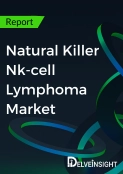NK-cell lymphoma is a rare and aggressive cancer that originates in natural killer (NK) cells—immune system components responsible for targeting infected or malignant cells. The most prevalent subtype, extranodal NK/T-cell lymphoma, nasal type (ENKL), primarily affects the nasal region but can also involve the skin, gastrointestinal tract, and lymph nodes. Given its aggressive progression and limited treatment options, the NK-Cell Lymphoma Treatment Market is rapidly evolving, with an increasing focus on innovative therapeutic approaches.
This article explores the expanding NK-Cell Lymphoma Therapeutics Market, examining the treatment landscape, market dynamics, and leading pharmaceutical companies driving advancements in the field. Additionally, it highlights emerging therapies and the growing number of industry players investing in new treatment solutions.
Understanding the NK-Cell Lymphoma Treatment Market
NK-cell lymphoma, particularly ENKL, is more commonly diagnosed in East Asia and Latin America and has been strongly linked to Epstein-Barr virus (EBV) infections. The disease presents diagnostic challenges due to nonspecific symptoms, making early detection difficult and reducing the effectiveness of existing treatments. Current therapeutic options primarily involve chemotherapy and radiation, though they are often associated with limited success rates and a high likelihood of relapse. This underscores the need for novel, more effective treatment approaches.
Key Drivers of Market Growth
-
Rising Incidence Rates
The increasing prevalence of NK-cell lymphoma, particularly in regions where it is more commonly diagnosed, is driving demand for better treatment solutions. Improved awareness and advancements in diagnostic technologies are also facilitating earlier detection and intervention. -
Limited Treatment Options
Standard chemotherapy regimens frequently yield suboptimal results, with high relapse rates and poor long-term outcomes. The unmet medical need for more effective therapies has intensified research efforts in immunotherapy and targeted treatments. -
Breakthroughs in Immunotherapy
The development of immunotherapies—including immune checkpoint inhibitors, monoclonal antibodies, and CAR-T cell therapies—represents a promising frontier in NK-cell lymphoma treatment. These therapies are designed to leverage the body’s immune response to combat the disease more effectively. -
Strategic Industry Collaborations
Major pharmaceutical companies and research institutions are increasingly forming partnerships to accelerate the development of novel NK-cell lymphoma treatments. These collaborations are expected to drive faster innovation and market entry for cutting-edge therapies.
Challenges in the NK-Cell Lymphoma Therapeutics Market
Despite strong market growth, several obstacles must be addressed to ensure the successful introduction and adoption of new treatments:
- High R&D and Clinical Trial Costs: Developing advanced immunotherapies and targeted treatments demands significant financial investment, which can be a barrier to market entry for smaller biotech firms.
- Regulatory Hurdles: Oncology drug approvals require rigorous testing and regulatory compliance, often prolonging the time-to-market for new therapies.
- Accessibility and Affordability Issues: Ensuring widespread access to NK-cell lymphoma treatments, particularly in lower-income regions, remains a significant challenge. Addressing pricing and reimbursement concerns is crucial for broader market penetration.
Overview of the NK-Cell Lymphoma Drugs Market
Several emerging treatment approaches are being explored to improve patient outcomes. These include:
- Chemotherapy: Standard regimens like CHOP (cyclophosphamide, doxorubicin, vincristine, and prednisone) and ESHAP (etoposide, methylprednisolone, high-dose cytarabine, and cisplatin) are widely used but have limitations due to high relapse rates.
- Immunotherapy: Immune checkpoint inhibitors, such as PD-1/PD-L1 inhibitors, are being investigated for their ability to enhance the immune system’s response to NK-cell lymphoma.
- Targeted Therapies: Drugs focusing on molecular pathways involved in NK-cell lymphoma, including those targeting the tumor microenvironment and EBV-related mechanisms, are showing promise.
- Stem Cell Transplantation: Allogeneic hematopoietic stem cell transplantation (HSCT) is a potential curative option but is associated with significant risks and is only suitable for select patients.
Leading Players in the NK-Cell Lymphoma Companies
Several pharmaceutical companies are at the forefront of developing innovative NK-cell lymphoma therapies:
- Novartis: A leader in immunotherapy, Novartis is developing advanced treatments aimed at enhancing immune responses against lymphoma.
- Gilead Sciences: Focuses on cellular therapies and immune checkpoint inhibitors for various blood cancers, including NK-cell lymphoma.
- AbbVie: Actively researching targeted therapies and immune-oncology solutions to improve lymphoma treatment outcomes.
- Bristol-Myers Squibb (BMS): A pioneer in immuno-oncology, BMS is working on immune checkpoint inhibitors tailored for NK-cell lymphoma.
- Takeda: With a strong presence in hematologic oncology, Takeda is exploring novel targeted therapies to improve patient care.
Conclusion
The NK-Cell Lymphoma Therapeutics Market is poised for significant growth as novel therapies—particularly immunotherapies and targeted treatments—continue to advance. The rising incidence of the disease, combined with the limitations of traditional therapies, is fueling demand for more effective solutions. Leading pharmaceutical companies such as Novartis, Gilead, and AbbVie are making notable strides in the development of NK-cell lymphoma treatments. As industry collaborations accelerate innovation, the future holds promise for improved patient outcomes and expanded treatment options in the NK Cell Lymphoma Companies landscape.
Latest Reports Offered By Delveinsight
Leukocyte Adhesion Deficiency Market | Life Science Business Development | Life Science Consulting | Lymphedema Market | Mallory-weiss Tear Market | Medical Marijuana Market | Mismatch Repair Deficiency Market | Molecular Glue Market | Natural Killer Nk -cell Lymphoma Market | Nerve Sheath Neoplasms Market | Net Market | Neuroleptic Malignant Syndrome Market | Ntm Market | Oncocytoma Market | Ophthalmoplegia Market | Wide Neck Bifurcation Intracranial Aneurysms Market | Phosphoglucomutase Pgm 1 Deficiency Market | Plague Market | Point Of Care Glucose Testing Market | Polypoidal Choroidal Vasculopathy Market | Primary Gastric Lymphoma Market | Research Subscription | Ringworm Market | Scabies Market | Wolman Disease Market | Subscription Healthcare | Wound Irrigation Systems Market | Trastuzuma Biosimilar
About DelveInsight
DelveInsight is a market research and consulting firm specializing in life sciences and healthcare. We deliver valuable insights to help pharmaceutical, biotechnology, and medical device companies succeed in a competitive and rapidly changing industry.
Contact Information
Kanishk
Email: kkumar@delveinsight.com

